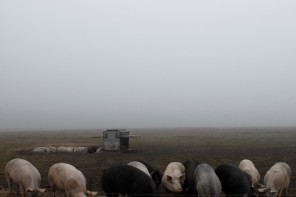Ski resorts of the French Alps are typically the stomping ground of the rich and famous who inhabit luxury million-euro chalets, spending a good years’ salary on just one week of snowy indulgence. On the other end of the scale, seasonaires flood in at the beginning of every winter season to work hard and play harder, and vanish again when the spring comes. They’re squeezed into shoe-box apartments and worked to within an inch of their life. Would you go even smaller,and willingly live in a 8m2 converted Ford Transit at 1700m altitude through a heavy Alpine winter? Nightmarish though it sounds, Toby Ryan is one of a small community of van dwellers who live ‘the high life’ atop the mountains in a French ski resort. He explains the beneficial aspects of this lifestyle to Sensa Nostra, and tells us how it has had a positive impact on his life.
My girlfriend and I met in 2007 whilst working in a bar during a winter season in the Alps. At the end of the winter, we moved to London because we wanted to have a complete change of scenery. We planned to return to the mountains for the following winter, but we couldn’t find a way to leave London before February due to work and flat contracts. Despite having friends in the Alps, there was no guarantee of a job or accommodation if we just turned up halfway through the season. We came up with the solution of converting a van and fully winterising it for the cold conditions. By bringing our home with us we would solve the problem of where to live, as well as providing transport between the UK and France. If we couldn’t find work, it wouldn’t matter, as we would already have our own accommodation and wouldn’t have to earn money to pay rent. Just before leaving London, in the middle of a bitter snowy winter, we bought a vehicle and embarked on building our home in the back of it. It’s a converted Ford Transit and, not including the cab, is 4m long, 2m wide and 2m high. Building our van-home was an adventure in itself, and took us much longer than we expected.
We designed it to be fully-winterised and self-sufficient. I’d spent a few months working with an electrician, a plumber, and a boat-builder, and so had a few building skills before starting the project… But most of the specific knowledge I learnt from a Haynes manual and the internet. We stayed flexible on the build, changing parts constantly until we came up with the right mix. We originally estimated it would take as little as two months to throw a mattress and a camping stove in the back. In total it took us a year and a half, but in return we had a tiny palace on wheels.
When we began our van conversion project it wasn’t greeted with the universal optimism we had for it. I think some people don’t really understand what the point is. The natural position for many is to question your sanity, and whether you’ve thought about heating and hot water, etcetera. Most people from the UK have only ever gone camping in a tent or a camper van in the summer time, for a couple of weeks, so they were totally bewildered when we told them of our plans to go to 1700m above sea level and make a Ford Transit our home for the winter!
Many friends indirectly suggest that it is not a clean or tidy way to live. That’s funny, because so many flats in the Alps are rented and trashed by seasonnaires every year. Our van is ours, and we take care to keep things tidy—mainly as a necessity, as there is not much room. An untidy/unclean van is a difficult place to live.
There used to be no facilities for people to live in vans in the ski resort we live in, and this caused problems with the local people. Instead of banning living in vans, the local council decided to provide a site with amenities for anyone willing to brave the elements. Every van dweller has to have a local job, with an official work contract and monthly pay slips. We rent our pitches, just like someone rents a flat. Because of that we have respect for the area around our homes, and are now viewed as contributing members of the local community, rather than as a problem to get rid of.
We live in a community of fifteen other vans, perched on the edge of a valley, with a beautiful view of the mountains. Every van has access to full-time electricity, and we all share the toilet block, shower block, and hot water. It’s lot more community-based than anywhere else I have lived. You think more about your neighbours because of the limited resources, and everyone is there to help out with any problems you may encounter. Because we now have facilities on the site, we no longer need the original 350-liter water tank and backup water heater in the van, so we removed them to make room for a clothes storage space and some drawers. We tend to make all our internal alterations and repairs before a winter begins. Home renovation is not the sort of thing you want to be attempting in the middle of a busy Alpine winter!
Tiny living does not have to mean basic. We didn’t have to get rid of all of our belongings, we just had to think about them differently. When I lived in a house or flat, I kept everything, amassing a huge amount of stuff that i didn’t really need, or even want. Now, size vs usefulness vs emotional attachment vs desire is a constant thought process when bringing anything inside. You end up being pretty ruthless about what you keep and what you throw/give away. It’s a good lesson in what you actually need to live. aving less space makes it easier to let go of non-essentials. We also have some very good storage solutions.
That being said, space can obviously be an issue, especially with two of us in the van. It’s important to have time to yourself and we have to be thoughtful of each others space. I’m out most nights working and not back until late, so my girlfriend had evenings to herself. Last winter I had a year off snowboarding, and had loads of daytimes to myself while she went out on the slopes.
I work as a DJ and play up to ten gigs a week, all over the Alps. My girlfriend teaches French to the English-speaking community. We’re both able to work for ourselves doing things we love. Because our van costs very little to run, we were able to spend time working on our own projects until we were good enough to do them professionally, instead of working hard in unsatisfying jobs just to cover the rent. We do pay some rent, but not so much that it eats up all our earnings. We have no contracts for water, gas, electricity, or ground rent. This way of living suits us at the moment as we can travel in the summertime, and take influence from the places we visit. Having the van is like owning a home. Not in terms of the investment, but in terms of a worry-free place to return home to.
We travelled in our van when we first built it, through France during a very hot summer; but for the most part during the winter, when we live in it, the van is stationary. Part of the deal with the plot we rent is that it is only for a vehicle. We cannot build additional structures. This is so we conform with the national French laws regarding motorhome pitches. At the end of each winter we move the van to a regular car park, where it is kept—with a friendly watchful eye from the police—until we return the following year. To build a permanent house of a similar size in the Alps, you’d have to buy a plot of land to build upon. Land prices in the Alps are amazingly high, and hard to find. Plus, the house can’t move! So for now, we are sticking with our van.







